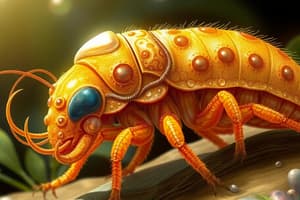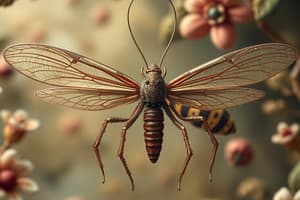Podcast
Questions and Answers
What is a parasite and how does it obtain food from its host?
What is a parasite and how does it obtain food from its host?
A parasite is an organism that lives in or on another organism (host) and obtains food at the expense of the host.
Define an organism that can live independently or occasionally become parasitic under certain conditions.
Define an organism that can live independently or occasionally become parasitic under certain conditions.
This organism is called a facultative parasite.
What is the difference between infestation and infection in the context of parasites?
What is the difference between infestation and infection in the context of parasites?
Infestation refers to parasites living outside the body of the host, while infection involves parasites residing inside the host.
What is a definitive host and why is it significant for a parasite's life cycle?
What is a definitive host and why is it significant for a parasite's life cycle?
What is a host that does not transmit infectious agents to other susceptible hosts called?
What is a host that does not transmit infectious agents to other susceptible hosts called?
What type of interaction exists when one organism benefits at the expense of another?
What type of interaction exists when one organism benefits at the expense of another?
Explain what zoonoses are.
Explain what zoonoses are.
What does commensalism refer to in biological interactions?
What does commensalism refer to in biological interactions?
What is anthropozoonosis and how is it transmitted to humans?
What is anthropozoonosis and how is it transmitted to humans?
Define zooanthroponosis and provide an example of how it can spread.
Define zooanthroponosis and provide an example of how it can spread.
Differentiate between directly transmitted infections and those transmitted via arthropods.
Differentiate between directly transmitted infections and those transmitted via arthropods.
Explain the difference between specific and incidental parasites.
Explain the difference between specific and incidental parasites.
What is the role of a reservoir host in the context of infectious diseases?
What is the role of a reservoir host in the context of infectious diseases?
What is one example of how humans may become infected with anthropozoonosis?
What is one example of how humans may become infected with anthropozoonosis?
What distinguishes a facultative parasite from other types of parasites?
What distinguishes a facultative parasite from other types of parasites?
In the context of zoonosis, what is an arthropod's role as a vector?
In the context of zoonosis, what is an arthropod's role as a vector?
How is a reservoir host relevant in the transmission of zooanthroponosis?
How is a reservoir host relevant in the transmission of zooanthroponosis?
What kind of parasite is typically characterized by establishing itself in unusual hosts?
What kind of parasite is typically characterized by establishing itself in unusual hosts?
What is a phoretic interaction and how does it relate to parasitic behavior?
What is a phoretic interaction and how does it relate to parasitic behavior?
How does a parasite's dependence on its host influence its life cycle?
How does a parasite's dependence on its host influence its life cycle?
What defines a definitive host and what is its role in a parasitic life cycle?
What defines a definitive host and what is its role in a parasitic life cycle?
What distinguishes incidental hosts from definitive hosts in a parasite's life cycle?
What distinguishes incidental hosts from definitive hosts in a parasite's life cycle?
In what way do zoonotic diseases pose a threat to human health?
In what way do zoonotic diseases pose a threat to human health?
How does a reservoir host differ from an incidental host in disease transmission?
How does a reservoir host differ from an incidental host in disease transmission?
How do specific parasites differ from those that have incidental hosts?
How do specific parasites differ from those that have incidental hosts?
What is the significance of understanding commensal relationships in ecological studies?
What is the significance of understanding commensal relationships in ecological studies?
Flashcards
Anthropozoonosis
Anthropozoonosis
A disease maintained in nature primarily by animals, but can be transmitted to humans.
Zooanthroponosis
Zooanthroponosis
A parasitic infection naturally found in humans, but can be transmitted to other vertebrates.
Incidental Parasite
Incidental Parasite
A parasite that infects a host that is not its usual host.
Intermediate host
Intermediate host
Signup and view all the flashcards
Definitive Host
Definitive Host
Signup and view all the flashcards
Host
Host
Signup and view all the flashcards
Parasite
Parasite
Signup and view all the flashcards
Ectoparasite
Ectoparasite
Signup and view all the flashcards
Endoparasite
Endoparasite
Signup and view all the flashcards
Zoonosis
Zoonosis
Signup and view all the flashcards
Parasitism
Parasitism
Signup and view all the flashcards
Study Notes
Parasitology - Lecture 1
- Parasitology is the study of parasites affecting humans.
- A parasite is an organism that lives in or on another organism (host) and gets its food from or at the expense of its host.
- The host is the organism in or on which a parasite lives.
Types of Parasites
- Obligatory parasites: Cannot complete their life cycle without a suitable host.
- Facultative parasites: Can live independently of a host but may occasionally be parasitic under certain conditions.
- Ectoparasites: Live outside the body of the host (infestation).
- Endoparasites: Live inside the host (infection).
- Accidental (incidental) parasites: Attack or establish themselves in unusual hosts.
- Temporary parasites: Feed on a host and then leave. Examples include biting insects.
- Specific parasites: Affect specific host species.
- Coprozoic (spurious) parasites: Pass through the digestive tract without infecting the host.
Types of Hosts
- Definitive host: Hosts where the parasite reaches its mature form and is typically capable of reproduction.
- Intermediate host: Hosts that harbor the non-sexual (reproductively/sexually immature) phases of the parasite. It often serves as the site of asexual reproduction.
- Reservoir host: An animal that harbors the parasite and acts as a continuous source of human infection.
- Paratenic (transport) host: Hosts that harbor the sexually immature parasite but are not necessary for the parasite's development cycle to progress.
- Blind (end) host: Hosts from which infectious agents are not transmitted to other susceptible hosts.
- Vector: Arthropods that harbor parasitic stages and transmit them from one host to another.
Zoonoses
- Zoonoses are infectious diseases transmitted from animals (usually vertebrates) to humans.
- Anthropozoonoses are zoonoses maintained in nature by animals and are transmissible to humans.
- Zooanthroponoses are parasitic infections naturally maintained by humans but can be transmitted to other vertebrates.
- Anthroponoses are diseases transmissible from humans to humans (only human species).
Classification of Zoonotic Diseases
- Feral or sylvatic zoonosis: The source of infection is a wild animal with no close relationship to man. Humans become exposed to infection during hunting.
- Domestic zoonosis: The source is man's own domesticated animals.
Classification of Zoonotic Diseases by Method of Infection
- Direct zoonosis: Infection is directly transmitted from the reservoir host to man.
- Metazoonosis: Infection is transmitted from the reservoir host to man via arthropods.
- Saprozoonosis: Infection is transmitted via a non-animal developmental site, such as soil and water.
Classification of Parasites
- Protozoa: Unicellular parasites (e.g., malaria, amoebiasis). Endoparasites.
- Helminthes: Multicellular parasites (e.g., tapeworms, flukes, roundworms) - often endoparasites
- Arthropods: Ectoparasites - organisms like insects, ticks, mites
Host-Parasite Interactions
- Parasitism: One organism benefits at the expense of another.
- Commensalism: One organism benefits, and the other is neither harmed nor benefited.
- Mutualism: Both organisms benefit from the relationship.
- Phoresis: (or transport) One organism utilizes another for transportation.
Parasite Questions
- Incidental parasite: Parasites that attack or establish themselves in unusual hosts.
- Blind host: A host from which infectious agents are not transmitted to other susceptible hosts.
Studying That Suits You
Use AI to generate personalized quizzes and flashcards to suit your learning preferences.





